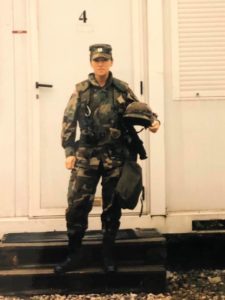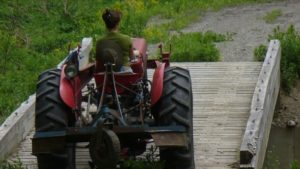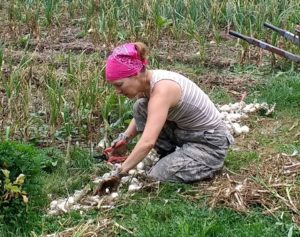Veterans’ Reflections on Farms Ops
Farming was a career changing decision for Nina Saeli.
Editor’s Note: In this new series of essays, veterans who have participated in our Farm Ops program will be sharing their experiences in service, in farming, and in life.

Nina served for two decades and when she left the military, she felt she lost her sense of purpose. Courtesy of Nina Saeli.
There are many things the average person does not understand about military service, and for those of us who have served, whether it be 3 years or 23 years, it can be difficult to explain. The difficulty of explaining something can be because you cannot think of the right words; you do not think the person you are speaking to would understand; or you just do not want to share that part of yourself with anyone. I left home at 17, entered service at 19, and retired at age 40. No matter how long a veteran may serve, the experiences of that service never leave; those experience are always part of him/her. I cannot even begin to describe to you what a career in the military was like, but I can tell you that when I left the military, I felt as if I had lost that sense of purpose. Farming changed that.
If I were asked why Cornell Small Farms initiated a program called “Farm Ops”, I could not explain why. Sometimes the why is not important; sometimes just knowing that someone thought to do something for you even if he/she does not know you, your history or anything about you, is all that is important. How much did Cornell Small Farms know about veterans? I cannot answer that either. What I can say is that Farm Ops changed my life, and besides the military and having a child, there are not many things I can say ‘changed my life’. For many veterans, Farm Ops provides opportunities to explore farming as a way to regain that sense of purpose. Any farmer, veteran or not, can relate to that.

After farming for the past three years, Nina can easily describe how military skills can be used to farm successfully.
Courtesy of Nina Saeli
I cannot recall how I received an invitation to a week-long event in 2015, sponsored by the Cornell Small Farms Program and the National Center for Appropriate Technology (NCAT), called Armed to Farm, but I know that my husband and I accepted it. At the time I had been growing only a few vegetables and herbs at my husband’s and doctor’s request, to limit my activities following two spine surgeries that had restricted my physical abilities. Fast forward to today and I would warn people that every day on a farm can be a cross fit session.
Until 2015, I had only been gardening for fun and therapeutic reasons. I never dreamed that growing plants as an occupation would appeal to me. When I encounter Soldiers I know from my military service and tell them that I am a farmer, they are always surprised, almost dumbfounded by the concept. Probably because there are not a lot of immediate correlations between military service and farming, yet after farming for the past 3 years, I can easily describe how military skills can be used to farm successfully.

Nina had been gardening for fun and therapeutic reasons, but after joining a week-long Armed to Farm training with the Farm Ops project she decided to turn gardening into farming.
Courtesy of Nina Saeli
My husband, also a retired veteran, began clearing space for a Market Garden within a week of returning from Armed to Farm 1.0. He tilled a 50’ x 38.5’ plot, and told me that we would be planting vegetables in it that plot in the spring. That plot intimidated me, and not many things intimidate me. The fact I felt intimidated guaranteed that I would find a way, not only to do what I was asked to do, but to be good at it. Any service member can recall the challenges, the requirements to constantly learn new things, and the expectation to excel in everything as a typically part of their experience while in the military. My challenges with this plot of soil would be no different.
It has been 3 years since I sat starring at that single plot of soil, trying to figure out how I would successful grow food. Since then my husband has tilled up seven more of those plots and more will be coming in the future. Since then I have learned about soil heath and crop rotation. Since then I have learned to drive a tractor and how not to damage that tractor, although my husband may say I still have much to learn when it comes to tractors. Since then I have learned I hate weeding carrots more than I hate weeding onions. Since then I have learned to grow vegetables that I had never before eaten, and I learned the enjoyment of discovering new tastes and flavors in my meals. Since then we have been selling our produce at three farmer’s markets and on a farm stand. Since then I have learned how to preserve my food for the long winters that face us each year. Since then I have been able to share my experiences with other veterans interested in discovering and learning about this new way of life outside military service. Since then, Cornell Small Farms and NCAT, but especially the Farm Ops program, has helped to turn this veteran into a farmer.

